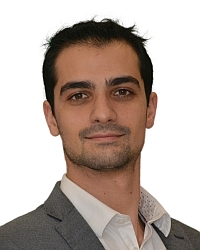TR2025-018
User Preference Meets Pareto-Optimality in Multi-Objective Bayesian Optimization
-
- , "User Preference Meets Pareto-Optimality in Multi-Objective Bayesian Optimization", AAAI Conference on Artificial Intelligence, DOI: 10.1609/aaai.v39i19.34230, February 2025.BibTeX TR2025-018 PDF
- @inproceedings{Ip2025feb,
- author = {{{Ip, Joshua Hang Sai and Chakrabarty, Ankush and Mesbah, Ali and Romeres, Diego}}},
- title = {{{User Preference Meets Pareto-Optimality in Multi-Objective Bayesian Optimization}}},
- booktitle = {AAAI Conference on Artificial Intelligence},
- year = 2025,
- month = feb,
- doi = {10.1609/aaai.v39i19.34230},
- url = {https://www.merl.com/publications/TR2025-018}
- }
- , "User Preference Meets Pareto-Optimality in Multi-Objective Bayesian Optimization", AAAI Conference on Artificial Intelligence, DOI: 10.1609/aaai.v39i19.34230, February 2025.
-
MERL Contact:
-
Research Areas:
Abstract:
Incorporating user preferences into multi-objective Bayesian optimization (MOBO) allows for personalization of the optimization procedure. Preferences are often abstracted in the form of an unknown utility function, estimated through pair- wise comparisons of potential outcomes. However, utility- driven MOBO methods can yield solutions that are dominated by nearby solutions, as non-dominance is not enforced. Additionally, classical MOBO commonly relies on estimating the entire Pareto-front to identify the Pareto-optimal solutions, which can be expensive and ignore user preferences. Here, we present a new method, termed preference-utility-balanced MOBO (PUB-MOBO), that allows users to disambiguate be- tween near-Pareto candidate solutions. PUB-MOBO com- bines utility-based MOBO with local multi-gradient descent to refine user-preferred solutions to be near-Pareto-optimal. To this end, we propose a novel preference-dominated utility function that concurrently preserves user-preferences and dominance amongst candidate solutions. A key advantage of PUB-MOBO is that the local search is restricted to a (small) region of the Pareto-front directed by user preferences, alleviating the need to estimate the entire Pareto- front. PUB-MOBO is tested on three synthetic benchmark problems: DTLZ1, DTLZ2 and DH1, as well as on three real-world problems: Vehicle Safety, Conceptual Marine De- sign, and Car Side Impact. PUB-MOBO consistently outperforms state-of-the-art competitors in terms of proximity to the Pareto-front and utility regret across all the problems.
Related News & Events
-
NEWS MERL Papers and Workshops at AAAI 2025 Date: February 25, 2025 - March 4, 2025
Where: The Association for the Advancement of Artificial Intelligence (AAAI)
MERL Contacts: Toshiaki Koike-Akino; Jing Liu; Kuan-Chuan Peng; Diego Romeres; Ye Wang
Research Areas: Artificial Intelligence, Machine Learning, OptimizationBrief- MERL researchers presented 2 conference papers, 2 workshop papers, and co-organized 1 workshop at the AAAI 2025 conference, which was held in Philadelphia from Feb. 25 to Mar. 4, 2025. AAAI is one of the most prestigious and competitive international conferences in artificial intelligence (AI). Details of MERL contributions are provided below.
- AAAI Papers in Main Tracks:
1. "Forget to Flourish: Leveraging Machine-Unlearning on Pretrained Language Models for Privacy Leakage" by M.R.U. Rashid, J. Liu, T. Koike-Akino, Y. Wang, and S. Mehnaz. [Oral Presentation]
This work proposes a novel unlearning-based model poisoning method that amplifies privacy breaches during fine-tuning. Extensive empirical studies show the proposed method’s efficacy on both membership inference and data extraction attacks. The attack is stealthy enough to bypass detection based defenses, and differential privacy cannot effectively defend against the attacks without significantly impacting model utility.
Paper: https://www.merl.com/publications/TR2025-017
2. "User-Preference Meets Pareto-Optimality: Multi-Objective Bayesian Optimization with Local Gradient Search" by J.H.S. Ip, A. Chakrabarty, A. Mesbah, and D. Romeres. [Poster Presentation]
This paper introduces a sample-efficient multi-objective Bayesian optimization method that integrates user preferences with gradient-based search to find near-Pareto optimal solutions. The proposed method achieves high utility and reduces distance to Pareto-front solutions across both synthetic and real-world problems, underscoring the importance of minimizing gradient uncertainty during gradient-based optimization. Additionally, the study introduces a novel utility function that respects Pareto dominance and effectively captures diverse user preferences.
Paper: https://www.merl.com/publications/TR2025-018
- AAAI Workshop Papers:
1. "Quantum Diffusion Models for Few-Shot Learning" by R. Wang, Y. Wang, J. Liu, and T. Koike-Akino.
This work presents the quantum diffusion model (QDM) as an approach to overcome the challenges of quantum few-shot learning (QFSL). It introduces three novel algorithms developed from complementary data-driven and algorithmic perspectives to enhance the performance of QFSL tasks. The extensive experiments demonstrate that these algorithms achieve significant performance gains over traditional baselines, underscoring the potential of QDM to advance QFSL by effectively leveraging quantum noise modeling and label guidance.
Paper: https://www.merl.com/publications/TR2025-025
2. "Quantum Implicit Neural Compression", by T. Fujihashi and T., Koike-Akino.
This work introduces a quantum counterpart of implicit neural representation (quINR) which leverages the exponentially rich expressivity of quantum neural networks to improve the classical INR-based signal compression methods. Evaluations using some benchmark datasets show that the proposed quINR-based compression could improve rate-distortion performance in image compression compared with traditional codecs and classic INR-based coding methods.
Paper: https://www.merl.com/publications/TR2025-024
- AAAI Workshops Contributed by MERL:
1. "Scalable and Efficient Artificial Intelligence Systems (SEAS)"
K.-C. Peng co-organized this workshop, which offers a timely forum for experts to share their perspectives in designing and developing robust computer vision (CV), machine learning (ML), and artificial intelligence (AI) algorithms, and translating them into real-world solutions.
Workshop link: https://seasworkshop.github.io/aaai25/index.html
2. "Quantum Computing and Artificial Intelligence"
T. Koike-Akino served a session chair of Quantum Neural Network in this workshop, which focuses on seeking contributions encompassing theoretical and applied advances in quantum AI, quantum computing (QC) to enhance classical AI, and classical AI to tackle various aspects of QC.
Workshop link: https://sites.google.com/view/qcai2025/
- MERL researchers presented 2 conference papers, 2 workshop papers, and co-organized 1 workshop at the AAAI 2025 conference, which was held in Philadelphia from Feb. 25 to Mar. 4, 2025. AAAI is one of the most prestigious and competitive international conferences in artificial intelligence (AI). Details of MERL contributions are provided below.
